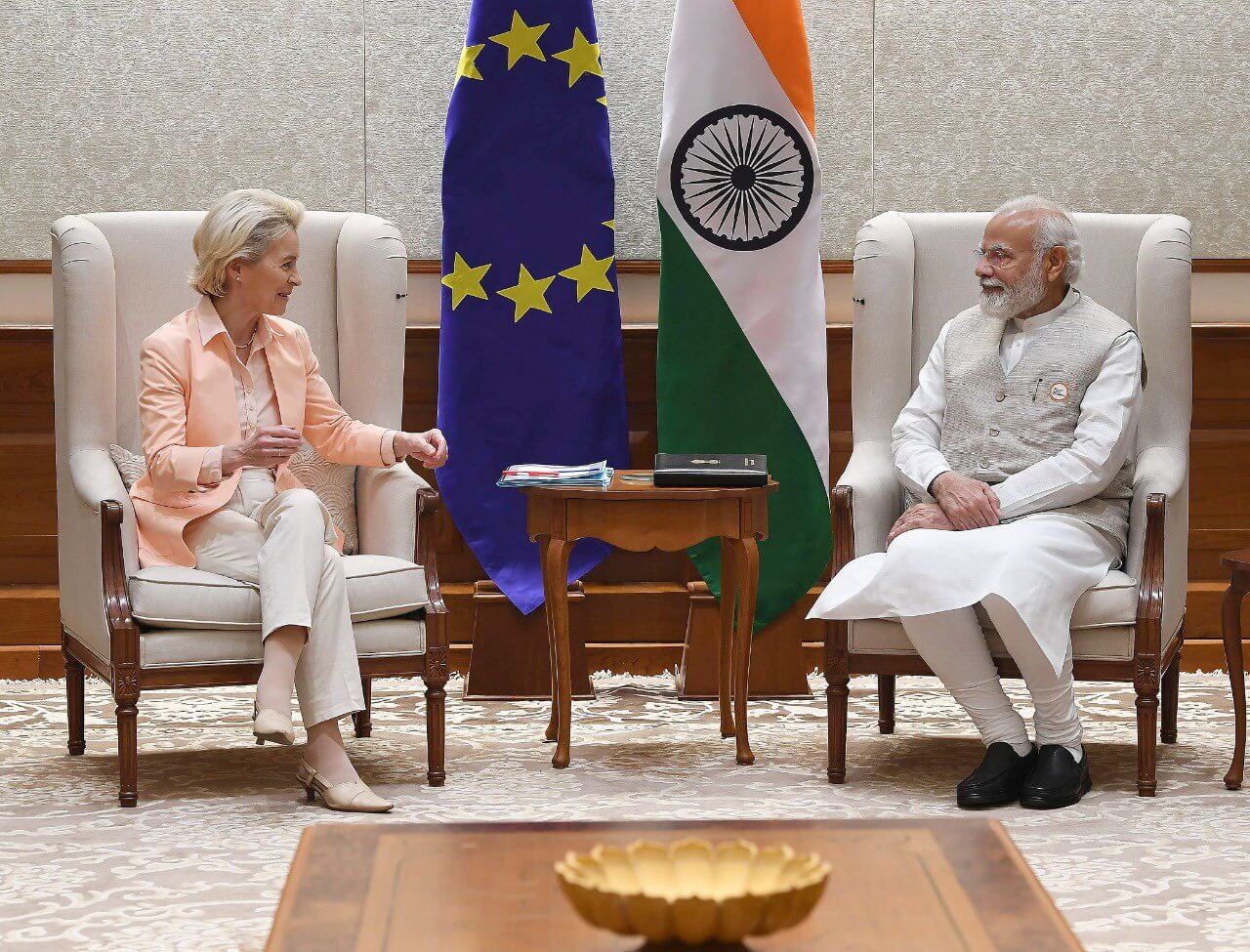During a meeting in New Delhi yesterday, Indian Prime Minister (PM) Narendra Modi and European Commission (EC) President Ursula von der Leyen agreed to resume negotiations on a free trade agreement that could potentially double bilateral trade ties to $220 billion over just five years.
According to an official release by the EC, Modi and von der Leyen agreed to launch negotiations on a Free Trade Agreement (FTA), an Investment Protection Agreement, and an Agreement on Geographical Indications in June.
Apart from being one of the largest investors in India, the EU is New Delhi’s third-largest trading partner, and its second-largest export destination. However, while both the EU and India have expressed the importance of the FTA since 2007, talks have been on hold since 2013 due to disagreements on several issues.
Strengthening the 🇪🇺🇮🇳 partnership is a key priority for this decade.
— Ursula von der Leyen (@vonderleyen) April 25, 2022
We will step up cooperation in trade, technology and security.
This is why I’m pleased that @narendramodi and I will establish an 🇪🇺🇮🇳 Trade and Technology Council.
The bloc has previously complained that the Indian side refuses to adequately open up its automobile and wine and spirits market. New Delhi has also been reluctant to give European firms access to its financial sector, specifically for banking, insurance and e-commerce. Additionally, India stands against the EU’s insistence on including issues such as labour regulations and environmental laws in the FTA.
However, signing the deal could double bilateral trade from $110 billion over a five year period. Keeping this in mind, both India and the EU remain interested in resuming discussions. In fact, India has held discussions with several European leaders, including representatives from Luxembourg, Denmark, and Italy to accelerate negotiations.
Modi and von der Leyen also launched the India-European Union (EU) Trade and Technology Council to enhance cooperation and counter challenges in trade, trusted technology and security.
Delighted to hold talks with President of @EU_Commission @vonderleyen earlier today. We reviewed the full range of India-EU ties including economic and cultural linkages. pic.twitter.com/Vc5jv1Lrqa
— Narendra Modi (@narendramodi) April 25, 2022
According to a joint press release published following the meeting, the leaders accepted the need for “joint in-depth strategic engagement,” specifically in light of the “rapid changes in the geopolitical environment.” While the statement did not elaborate on the nature of the geopolitical challenges, it appears to be a veiled mention of China’s aggression in the Indo-Pacific and Russia’s military invasion of Ukraine.
During her opening remarks, von der Leyen called India a “technological powerhouse.” To this end, she said that New Delhi and Brussels could “unleash an enormous amount of untapped potential” in the trade sector. “This will help us diversify and secure our supply chains, boost economic opportunities for our businesses, and bring significant benefits to our citizens,” she remarked.
In this context, Modi and von der Leyen agreed that the Council would “provide the political steer and the necessary structure to operationalise political decisions, coordinate technical work, and report to the political level to ensure implementation and follow-up in areas that are important for the sustainable progress of European and Indian economies.”
The signing of the agreement makes India the second country after the United States to establish such a Council with the bloc.
The pair also discussed the importance of transitioning to clean energy sources not only due to their environmental value but also their economic promise. In this respect, von der Leyen called for “more intense joint efforts on solar energy” and “cooperation on green hydrogen.”
“We are closely aligned with India in the fight against climate change. The solar energy will play a decisive role to reach our objectives on the way to net-zero, both in India and in Europe. Investment here also becomes an investment in our security. Every kilowatt we generate from solar, wind, hydropower or biomass, reduces our dependency on fossil fuels from abroad,” she noted.
Furthermore, von der Leyen visited the International Solar Alliance’s headquarters in India and The Energy and Resources Institute. Additionally, she convened discussions with several representatives of Indian and European energy companies.
Pleased to call on President of @EU_Commission @vonderleyen.
— Dr. S. Jaishankar (@DrSJaishankar) April 25, 2022
Discussed taking forward the #IndiaEU partnership. Also exchanged views on the economic and political implications of the Ukraine conflict. pic.twitter.com/tjN9CMnB5K
Away from the topic of trade and climate action, Modi and von der Leyen also touched on their different approaches to the Ukraine crisis. India has maintained a fairly neutral position, in that it has expressed condemnation of human rights abuses and called for peace and dialogue but has refused to outright blame Russia or vote against it in international fora. India has also provided Ukraine with essential humanitarian aid.
The Ukraine crisis also featured in von der Leyen’s discussions with Indian Minister of External Affairs S. Jaishankar, wherein the pair discussed the “economic and political implications” of the war.
My opening remarks during the fruitful meeting with President of the EU Commission @vonderleyen. pic.twitter.com/CMzTuxqlJx
— Narendra Modi (@narendramodi) April 25, 2022
In addition, the EU official also raised the issue during her opening speech at the Raisina Dialogue, which was co-chaired by von der Leyen and Modi. She warned that the conflict in Ukraine could “deeply affect the Indo-Pacific region and the rest of the world.” “For the Indo-Pacific it is as important as for Europe that borders are respected. And that spheres of influence are rejected. We want a positive vision for a peaceful and prosperous Indo-Pacific,” she said.
Meanwhile, during PM Modi’s opening remarks prior to the Raisina Dialogue, he expressed his gratitude to von der Leyen for her participation in the forum, which he said would not only benefit India’s “intellectual and academic” growth but also help advance global progress and development.

